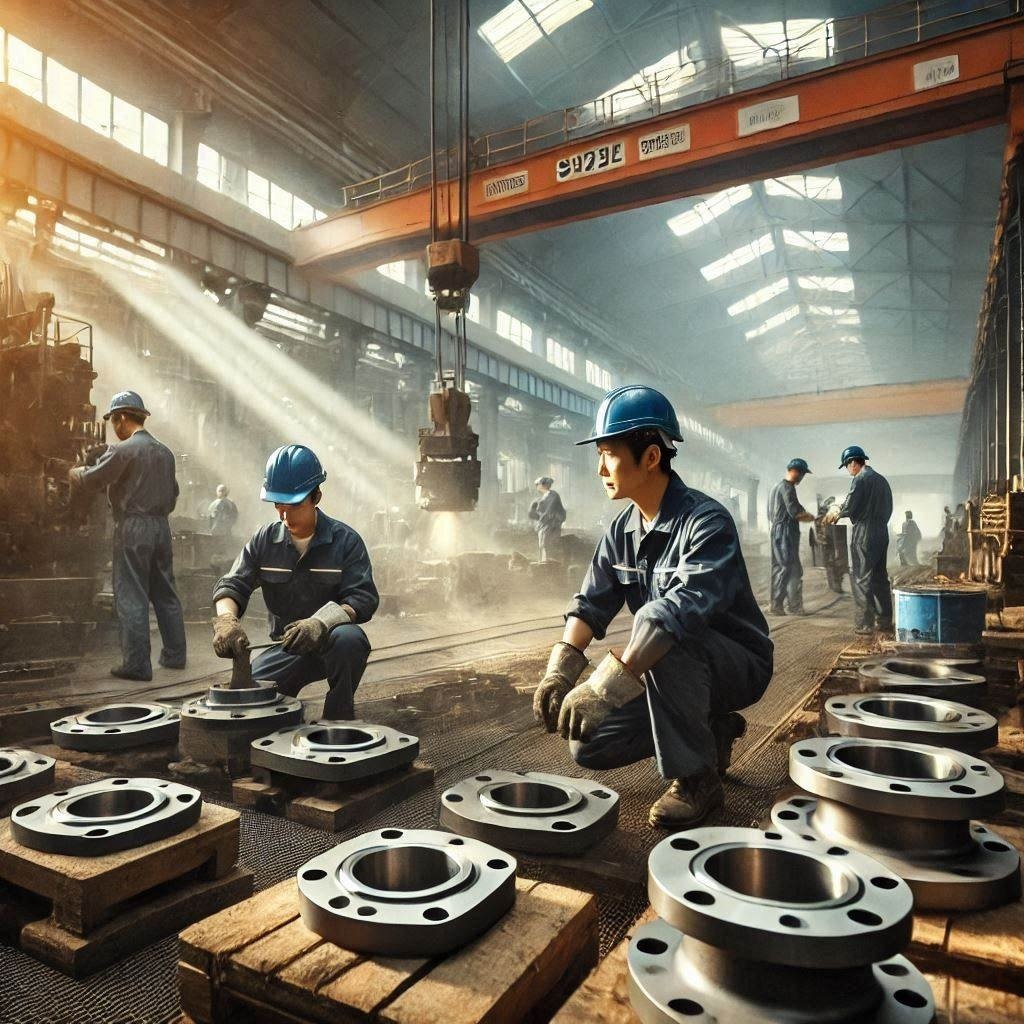Forged flanges are parts that are produced using the forging process. The process of forging generally involves the use of heavy machinery applying tremendous pressure to shape metals in order to increase their strength and durability. The usual material used for such flanges is steel, stainless steel, or some alloys, which come in ring form either raised or flat with bolt holes. It is used in piping systems as it is very connective in nature with pipes, valves, pumps, and even other equipment that requires a certain level of surefire, leak-tight seal against high pressure and temperature and, in some mechanical stress conditions of the oil, gas, generation, chemical processes, and in construction. As a result of this process, the flange has excellent strengths, durability, and resistance towards corrosion.
How is a Forged Flange manufactured?
Forged flanges are generated by the forging process designed with a process giving it its wanted shape and size using a hydraulic press or hammer that crushes and deforms the metal billet in high-pressure conditions. The raw material, firstly identified in the manufacturing process is usually steel, stainless steel or alloy. These are then heated up to highly extreme temperatures just to raise the malleability of the desired material. The heated billet is forged in the shape of a flange using the die with force. For precise dimensions and surface finish, it needs further secondary processes, like machining, apart from bolt hole position. It undergoes final quality checks as per industrial requirement to provide strength, toughness, and resistance to stress and corrosion. The forging process in this production process ensures excellent mechanical properties of forged flanges, thus easily adaptable for pressure as well as high temperature applications in some major industries such as those of oil, gas fields, chemical processing, and electricity generation.
What quality control measures are needed for forged flanges manufacturing
Quality control is very essential in forging flanges, since they must adhere to industrial standards for strength, durability, and safety. Raw material checks involve assessing whether the grade of raw material used is correct and free from defects. The needed quality control measure is proper temperature, pressure, and timing applied in the forging process, which would provide the desired material properties that will not allow cracks or porosity to occur. After forging, dimensional checks on flanges are performed with high accuracy to determine if they match the required dimensions. It assumes NDT techniques such as ultrasonic testing or dye penetrant inspection in the checking of the internal defects or surface anomalies of the flanges that may be affecting their usage. The flanges are then heat-treated to strengthen and harden, followed by surface finishing to prevent corrosion. The quality control measures of the manufacturer ensure forged flanges that are reliable, durable, and suitable for applications with high pressure and high temperature.
Applications and Uses of Various Kinds of Forged Flanges
Forged flanges have uses in numerous places because they are strong, solid, and not leak-prone in high pressure as well as temperature. The common application is pipe connection with pipes, valves, pumps, or other pieces of equipment that consist of the piping system, requiring a tight leakage joint. Different types of forged flanges have multiple applications. Weld neck flanges are widely used in highly stressed and pressurized applications, such as oil and gas, petrochemicals, and power generation. Slip-on flanges are most commonly used in low-pressure applications, where they are easily installed, and not too expensive for general piping system use. Blind flanges cover the ends of pipelines to prevent leakage or contamination within the pipeline system, especially with water treatment or chemical processing applications. Other variants of flanges are socket weld type and threaded type, with applications involving welds or threading applied. Since each of these forged flanges has a separate requirement, application, security in use, as well as efficiency along with durability become assured.
Conclusion
In conclusion, forged flanges are crucial in most industries and widely used today due to their strength, durability, and ability to withstand very high pressure and temperature as well as mechanical stress. The forging process, that is, applying high pressure to materials like steel and stainless steel, is regarded as having superior mechanical properties, especially in critical applications that fall within the oil and gas and power generation and chemical processing industries. The excellent manufacturing process complemented with strict quality control measures assures that Forged Flanges Manufacturers meets the stringent industry standards for performance and safety. With their multiple applications, forged flanges contribute to the strength and efficiency of piping systems. They ensure critical infrastructure is leak-proof and secured.
Also Read
- ► Different Types of Sweatshirts for Men
- ► How Local SEO Can Transform Your eCommerce Business
- ► How do steel forging suppliers meet increasing market demand for forged parts?
- ► What Are the Top Things to Be Considered for Choosing the Best Options for a Shipping Company
- ► What is the Minimum Salary Required for a Credit Card? All You Need To Know
- ► What Is the Difference Between an Interior Designer and Decorator?
- ► Everything You Need to Know About BGMI Free Scrims
- ► ✨ Sightcare Purchase Official Website: Order Now 2025 with Free Shipping Offer 🌍
- ► New trends and technologies in shaft production of forgings: innovation in shaft-making
- ► Unlock the Power of 5G Male: A Natural Performance Enhancer for Men
- ► How Zeal Integrated is Redefining Corporate Event Planning in Bangalore
- ► Cracked Windscreen? Here’s Why You Shouldn’t Ignore It
- ► Types of Trademarks You Can Register for Your Business
- ► 7 Benefits of Professional Bookkeeping Services
- ► Atlas Pro IPTV: A Game-Changer in Digital Entertainment





